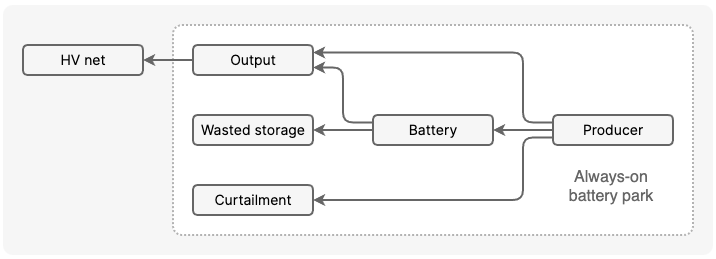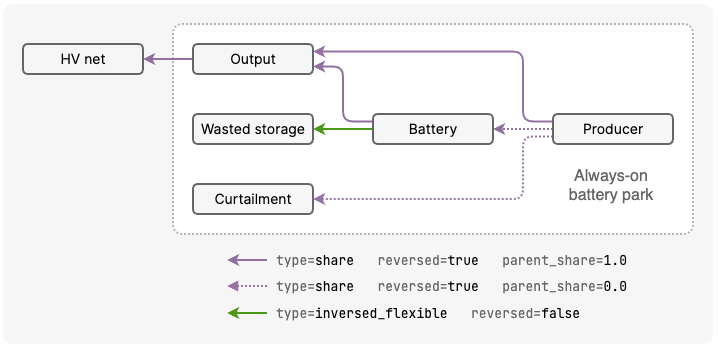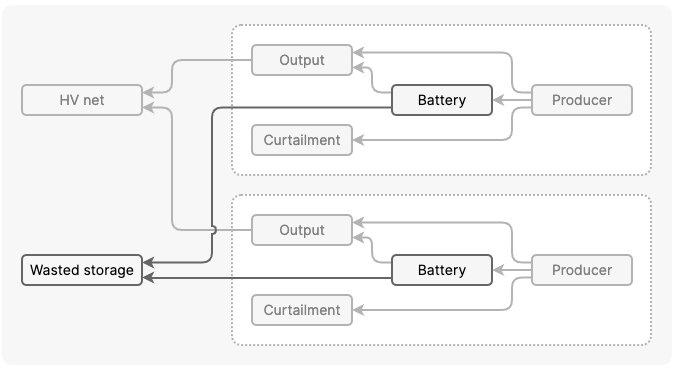Always-on battery parks
Always-on battery parks represent some kind of always-on electricity producer which is connected to the HV network via a capacity-limited interconnect. When the output of the producer exceeds the capacity of the interconnect, the energy is instead diverted into a battery. When the battery also has insufficient capacity – or no volume remaining – the electricity is curtailed.

Setting up a battery park
Graph structure
A battery park requires five nodes to be added to the graph:
- Producer: This represents wind turbines, solar panels, etc, which produce electricity according to a profile.
- Battery: When the producer outputs more energy than can be delivered to the HV network, the excess is provided to the battery.
- Curtailment: Energy is diverted here when the battery cannot store all the energy.
- Output: The producer and battery send energy to the output node before it is delivered to the grid.
- Wasted storage: Energy that decays in the battery, or is remaining at the end of the year, is directed into the wasted storage node.
All edges between nodes are reversed share edges, except that from the battery to wasted storage which should be inversed_flexible.

The "Wasted storage" node does not need to be unique to the battery park; many parks may share the same node.

Producer node
The producer requires the following merit_order attributes:
group: The name of the profile to be used to shape the hourly load from the producer.level: The level at which the technology appears in the electricity network.type: Always set toproducer.subtype: Always set toalways_on_battery_park.relations.curtailment: The key of the curtailment node.relations.output: The key of the output node.relations.storage: The key of the storage/battery node.
All attributes are required.
For example:
- merit_order.group = dynamic: wind_inland
- merit_order.level = hv
- merit_order.relations.curtailment = park_curtailment
- merit_order.relations.output = park_output
- merit_order.relations.storage = park_storage
- merit_order.subtype = always_on_battery_park
- merit_order.type = producer
Storage node
The storage node requires a storage attribute:
volume: The volume of the battery in MWh. May be zero. (Required)cost_per_mwh: The cost per MWh of installed storage volume. (Optional)decay: The percentage of stored energy that decays each hour. Defaults to zero. (Optional)
For example:
- storage.cost_per_mwh = 3.4
- storage.decay = 2.57202e-03
- storage.volume = 8400.0
Output node
The output node must have an electricity_output_capacity attribute which specifies how much energy can flow between it and the HV network each hour (in MW):
- electricity_output_capacity = 10
Outputs
The following data can be expected after the merit order has run.
Producer node
demand: the total amount of electricity produced annually, including energy which is curtailedelectricity_output_curvethe hourly electricity output from the producer, including curtailment
Battery node
demand: the total amount of electricity that flows through the battery in a yearelectricity_input_curve: the hourly electricity input to the batteryelectricity_output_curve: the hourly electricity output from the batterystorage_curve: a curve showing how much energy is stored in the battery for each hour in the year
Output node
demand: the total amount of electricity delivered to the HV network by the parkelectricity_output_curve: the hourly electricity which flows out from the output (and therefore from the producer and battery combined)
Curtailment node
demand: the total amount of curtailed energy from the producerelectricity_input_curve: describing how much energy is curtailed in each hour
Wasted storage
demand: the total amount of electricity from the battery which remains unused at the end of the year, or which decays while stored
Updating values with GQL
Change the amount of storage
UPDATE(
V(storage_node_key, storage),
volume,
USER_INPUT()
)
Alternatively, you may choose to set a non-zero volume in the node file and change the storage node's number_of_units attribute.
Change the capacity of the output to network connection
UPDATE(
V(output_node_key),
electricity_output_capacity,
USER_INPUT()
)